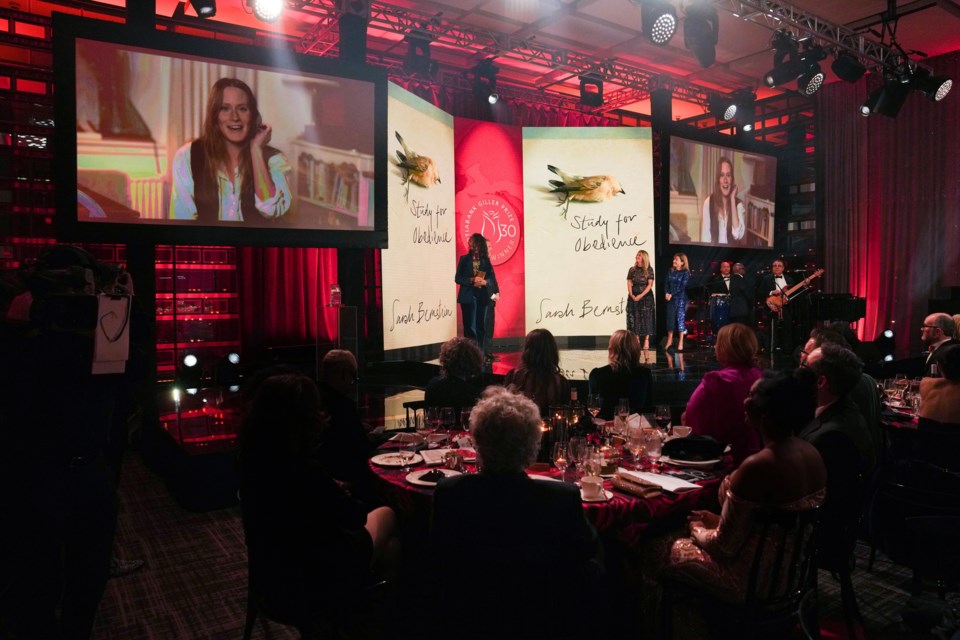TORONTO ÔÇö Montreal-born Sarah Bernstein won the Scotiabank Giller Prize in a 30th anniversary bash upended by anti-Israel protesters Monday night, when the usually staid gala was crashed by a handful of agitators.
The Scotland-based author of "Study for Obedience" accepted the $100,000 award remotely from her home in the Highlands, where she had a baby just 10 days ago.
Just as her name was called at the Toronto gala, a protester posing as a photographer interrupted the live telecast with antiwar slogans.
Police escorted the protester out of a star-studded ballroom, with guests including Margaret Atwood, Vincent Lam and host Rick Mercer. The CBC broadcast kept the cameras off the incident for the viewers at home.
Police said several people were taken into custody, but there was no word on charges late Monday.
Bernstein's win was announced again. A spokesperson said the author wasn't able to see the proceedings and didn't know about the protest.
In a speech delivered over video Bernstein stressed the importance of storytelling.
"I'm really privileged to have been afforded the opportunity to tell this story," Bernstein said.
"I think ... how important it is, now more than ever, to support writers in material ways who tell stories of their own people in their own ways, especially when their stories challenge dominant historical narratives."
The celebrations were also briefly halted early in the broadcast when several protesters jumped onstage, carrying signs that read "Scotiabank Funds Genocide." They were quickly escorted out by police.
Pro-Palestinian groups have taken issue with Scotiabank's investment in Elbit Systems Ltd., an Israeli arms firm.
Jurors lauded Bernstein's novel, published by Knopf sa╣·╝╩┤½├¢, as an incandescent modernist experiment.
The book is a short, absurdist novel light on plot. In it, a young woman tells her story of moving to a remote country to serve as her brotherÔÇÖs housekeeper. But despite her brother's high standing, she is reviled in his town and comes to be blamed for a series of tragedies that befall local animals.
Through the book, which is also shortlisted for the United Kingdom's Booker Prize, Bernstein explores questions of power, oppression and deference.
The novel is Bernstein's second. The first, "The Coming Bad Days," was published in 2021 to little fanfare.
In addition to her career as a novelist, Bernstein teaches creative writing and literature at the University of Strathclyde in Glasgow, Scotland.
The Giller awards $100,000 annually to the author of the best Canadian novel, graphic novel or short story collection published in English.
This year's runners up are Eleanor Catton for "Birnam Wood," Kevin Chong for "The Double Life of Benson Yu," Dionne Irving for "The Islands: Stories" and CS Richardson for "All the Colour in the World." Each receives $10,000.
The award was first handed out in 1994, a year after the death of its namesake, literary journalist Doris Giller.
Her husband, Jack Rabinovitch, founded the prize to further Giller's legacy. Like his wife, he sought to uplift Canadian literature with a heady dose of glitz and glamour.
"Jack wanted to make it big and sparkly," said Elana Rabinovitch, his daughter, who serves as executive director of the Scotiabank Giller Prize.
"To some extent, it still kind of is. That accrues to the benefit of the authors. That's what we want to give them, is more attention and time and exposure and the limelight."
In the three decades since its founding, the Giller has become something of a CanLit kingmaker.
Winners invariably see a bump in sales, as do those who make the short and long lists, Rabinovitch said. The phenomenon has become known as the "Giller Effect."
The list of past winners is venerable, and includes such names as Atwood, who won in 1996 for "Alias Grace," Alice Munro, who took home the prize in 1998 and again in 2004, Michael Ondaatje, who was recognized for "Anil's Ghost" in 2000 and Esi Edugyan, who received the award in both 2011 and 2018.
The award is such a fixture of the CanLit canon that in 2014, Carleton University introduced a course all about it.
Rosemarie Hoey designed and taught the seminar starting in 2014, inviting students to consider both the award-winning books and the prize's role in Canadian publishing.
"It's big business," said Hoey, who's now retired. "I'm sorry if that rattles the chains of some of the purists, but my God, writers have a tough enough job, often working full-time jobs teaching or shovelling French fries."
This report by The Canadian Press was first published Nov. 13, 2023.
Nicole Thompson, The Canadian Press



